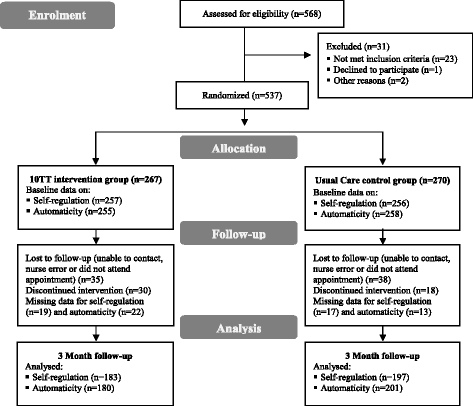The role of self-regulatory skills and automaticity on the effectiveness of a brief weight loss habit-based intervention: secondary analysis of the 10 top tips randomised trial
- PMID: 28870208
- PMCID: PMC5583960
- DOI: 10.1186/s12966-017-0578-8
The role of self-regulatory skills and automaticity on the effectiveness of a brief weight loss habit-based intervention: secondary analysis of the 10 top tips randomised trial
Abstract
Background: Habit-interventions are designed to promote the automaticity of healthy behaviours and may also enhance self-regulatory skills during the habit-formation process. A recent trial of habit-based advice for weight loss (10 Top Tips; 10TT), found that patients allocated to 10TT lost significantly more weight over 3 months than those allocated to usual care, and reported greater increases in automaticity for the target behaviours. The current study aimed to test the hypothesis that i) 10TT increased self-regulatory skills more than usual care, and ii) that self-regulatory skills and automaticity changes mediated the effect of 10TT on weight loss.
Methods: 537 obese patients from 14 primary care practices in the UK were randomized to receive 10TT or usual care. Patients in the 10TT group received a leaflet containing tips for weight loss and healthy habits formation, a self-monitoring log book and a wallet-sized shopping guide on how to read food labels. Patients were weighed and completed validated questionnaires for self-regulation and automaticity at baseline and 3-month follow-up. Within-group and Between-group effects were explored using Paired T-test and ANCOVA, respectively. Mediation was assessed using bootstrapping to estimate indirect effects and the sobel test.
Results: Over 3 months patients who were given 10TT reported greater increases in self-regulatory skills (Mean difference: .08; 95% CI .01; .15) than those who received usual care. Changes in self-regulatory skills and automaticity over 3 months mediated the effect of the intervention on weight loss (β = .52, 95% Bias Corrected CI .17; .91).
Conclusions: As hypothesised, 10TT enhanced self-regulatory skills and changes in self-regulatory skills and automaticity mediated the effect of the intervention on weight loss. This supports the proposition that self-regulatory training and habit formation are important features of weight loss interventions.
Trial registration: This study was prospectively registered with the International Standard Randomised Controlled Trials ( ISRCTN16347068 ) on 26 September 2011.
Keywords: Automaticity; Habit formation; Intervention; Self-regulation; Weight loss.
Conflict of interest statement
Ethics approval and consent to participate
Ethical approval was granted by South East London Research Ethics Committee 2 via IRAS (Ref No. 10/H0802/59, Approval granted 9th July 2010). All participants gave informed consent.
Consent for publication
Not applicable.
Competing interests
The authors declare that they have no competing interests.
Publisher’s Note
Springer Nature remains neutral with regard to jurisdictional claims in published maps and institutional affiliations.
Figures
References
-
- Finucane MM, Stevens GA, Cowan MJ, et al. National, regional, and global trends in body-mass index since 1980: systematic analysis of health examination surveys and epidemiological studies with 960 country-years and 9.1 million participants. Lancet. 2011;377:557–567. doi: 10.1016/S0140-6736(10)62037-5. - DOI - PMC - PubMed
-
- WHO . Global status report on noncommunicable diseases 2014 no. 978 92 4 156485. Geneva: World Health Organization; 2014.
Publication types
MeSH terms
Associated data
Grants and funding
LinkOut - more resources
Full Text Sources
Other Literature Sources
Medical
Research Materials



